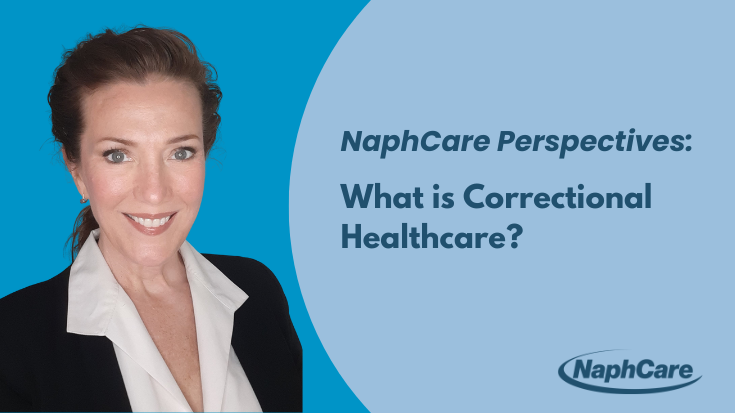
Read more
NaphCare is pleased to share our conversation with Amber Simpler, PhD, ABPP, Executive Director of Behavioral Health Research for the NaphCare Charitable Foundation. Dr. Simpler joined NaphCare in 2019 as Chief Psychologist, collaborating with NaphCare’s mental health professionals to improve clinical and operational processes, establish jail-based competency restoration programs, develop standardized clinical guidelines for mental health, and assist with innovative initiatives like our Mental Health Stabilization Units.
As she steps into her new role as Executive Director of Behavioral Health Research at the NaphCare Charitable Foundation, Dr. Simpler transitions from the clinical administrative world of forensic psychology into a research-focused career path. Within the next few years, she hopes to delve further into action-oriented efforts to better identify those in need of mental health support and, ultimately, disrupt the cycle of recidivism.
With her leadership, the NaphCare Charitable Foundation will be contributing research to help create a future where the needs of incarcerated populations can be assessed, evidence-based treatment applied, and adverse outcomes minimized. To make this vision a reality, all research data, findings and tools will be open source – meaning data will be made public to further scientific research by other organizations and institutions.
In our conversation with Dr. Simpler, she spoke about her career and leadership experience at NaphCare, as well as her thoughts about the future of correctional healthcare:
1. What led you to correctional health care?
Even before I knew I wanted to be a psychologist – principles of justice, fairness, and equity strongly influenced my thinking and behavior. Those tendencies – coupled with a helper instinct and an innate drive to champion the underdog – ultimately contributed to my commitment to serve the justice-involved population who endure behavioral health challenges.
2. What is the most pivotal moment or experience of your career thus far?
The most inspiring and foundational moment was teaching a Humanistic Psychology class in graduate school. I learned to appreciate the importance of finding value, purpose and meaning in all spheres of my life. Discovering this early in my career contributed to subsequent decisions about employment, style of leadership, and the footprint I want to leave.
3. What is your favorite thing about working at NaphCare?
The people. Working at NaphCare has afforded the opportunity to meet so many individuals - team members, patients, partners, colleagues, community leaders, etc. For anyone who knows me, it’s not surprising I enjoy conversation. Engaging with others is an opportunity to learn from and about them, and with each encounter, I walk away with new perspectives, new knowledge and sometimes a new to-do list.
4. Which of NaphCare’s core values aligns best with your leadership style?
Do the right thing – One of the central tenets of humanistic psychology is to be accountable and responsible for your actions. Doing the right thing does not always mean you make the correct choices – but it does mean you act with integrity, humility and respect. In my “showing” (instead of “telling”) leadership strategy, I believe consistently “doing the right thing” inspires others to do the same.
5. What helps you succeed in your demanding role?
While success is certainly subjective, I believe a combination of internal ambition and external support – coupled with eternal optimism that change is possible – have led me to where I am today. I also find balance between my work and home life is essential to prevent burnout.
6. Who is a mentor for you and what have you learned from him or her?
Dr. Mary Alice Conroy was my Director of Clinical Training in graduate school. In her early work as one of the first female psychologists in the federal prison system, she helped define today’s practice standards in the field of forensic psychology. Dr. Conroy is a fierce, sage advocate who demands excellence and challenges her trainees to push the boundaries of conventional practices to the next level. I am honored to have trained with her, and in the years since, my admiration and respect for her remains unparalleled.
7. What is the most promising thing happening in correctional healthcare right now?
The pendulum is shifting. The application of consequences in our criminal justice system is predicated on two competing goals: 1) restitution or punishment for the misdeed and 2) rehabilitation to deter future criminogenic behavior. Because these are seemingly opposing outcomes, it is almost impossible to achieve both simultaneously. Today, we recognize the vulnerabilities of the incarcerated population and better understand that supporting our fellow man with humanitarian efforts can lead to safer, healthier communities.
8. Describe the direction and goals for the NaphCare Charitable Foundation.
Our research efforts will focus on a triad of behavioral health concerns disproportionately prevalent in correctional environments – severe and persistent mental illness, chemical addiction, and suicidality.
Beyond gaining a better understanding of the nature and extent of these concerns in our inmate-patient population, we aim to use advanced technological strategies to develop tools that support prevention as primary treatment, clinical judgment, and improved long-term outcomes.